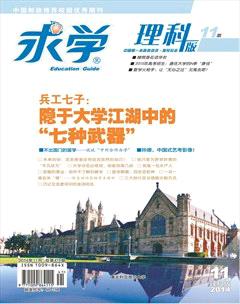一点一滴总关“情”
王德红
情态动词是一种本身有一定的词义,表示说话人的情绪、态度或语气的动词,但不能单独作谓语,只能和其他动词原形构成谓语。情态动词是英语动词中最复杂、最难把握的,也是每年高考英语的必考内容。笔者在分析了近几年全国各地有关情态动词高频考题的基础上,整理归纳了情态动词的一些常用考点,并结合具体事例进行阐述,希望对同学们的备考有所启发和帮助。
1. can
常用来表示“能力”,是一种客观情况,而be able to表示经过一番努力才做到(通常用于过去时态中)。如:
I am starving to death. I can eat two bowls of rice now.
我都快饿死了。我现在能吃两碗米饭。
The fire spread through the hotel very quickly but everyone was able to get out.
尽管这场大火迅速蔓延到整个宾馆,但是每个人都设法逃了出来。
用在肯定句中,表示可能性,是一种理论上的推测,常翻译成“有时会”。如:
It is often warm in my hometown in March, but it can be rather cold sometimes.
我的家乡三月份通常很暖和,但有时候相当冷。
-How are we going to the railway station?
-By bus! Attempting to call a taxi in our city, especially during rush hours, ________ be an exercise in frustration. (2013年江苏苏州一模)
A. can B. used to C. should D. has to
分析:答案为A。can在此意为“有时会”。
2. must
常用来表示必要性,意为“必须”,强调主观上必须做某事;而have to 意为“不得不”,强调客观上得做某事。如:
It is raining heavily outside, so he has to stay at home.
外面正下着大雨,他不得不待在家里。
He has made up his mind that he must finish the experiment before the deadline.
他已下定决心必须在截止日期前完成那个实验。
用于疑问句,表示责备、抱怨的感情色彩,意为“非得、偏要、硬要”,而mustnt则表示“禁止、不允许”,是说话人强有力的劝告。如:
-________ you interrupt now? Cant you see Im on the phone?
-Sorry Sir, but its urgent. (2014年重庆高考)
A. Can B. Should C. Must D. Would
分析:答案为C。must在此意为“非得、偏要、硬要”。
The new law states that people ________ drive after drinking alcohol. (2012年上海高考)
A. wouldnt B. neednt C. wont D. mustnt
分析:答案为D。mustnt在此意为“禁止、不允许”。
3. should
表示必要性,意为“ (义务上)应该”。如:
The young man should be responsible for yesterdays accident.
那个年轻人应该对昨天的事故负责。
表示推测,意为“按常理应该”。如:
It is already seven oclock now. She should be here at any moment.
现在已经七点了。她随时会到这里。
在某些名词性从句中,表示惊异、意外等情绪,常翻译为“竟然”。如:
-This city is a dull place to live in.
-How surprising that you ________ think so! I love it very much. (2012年江苏南通二模)
A. shall B. would C. might D. should
分析:答案为D。should在此意为“竟然”。
在虚拟条件状语从句中,表示将来不能实现的假设,意为“万一”。如:
The sleeping baby would be scared ________ a sudden loud noise. (2013年江苏南京三模)
A. was there B. there was
C. should there be D. there should be
分析:答案为C。此句为虚拟条件句表将来,省略了连词if,把should提前至从句句首,形成倒装,should翻译为“万一”。
4. will/would
would表示“意志、意愿”,适用于各种人称。如:
Days later, my brother called to say he was all right, but ________ say where he was. (2012年江苏高考)
A. mustnt B. shouldnt C. wouldnt D. mightnt
分析:答案为C。wouldnt在此意为“不愿意”。
will用来表示现在的习惯和特性,尤其是不受时限必然发生的情况;而would则表示过去的习惯或某种倾向。如:
Hes strange,he will sit for hours without saying anything.
他很奇怪,坐几个小时一句话也不说。
I still remember my happy childhood when my mother ________ take me to Disneyland at weekends. (2014年四川高考)
A. might B. must C. would D. should
分析:答案为C。would在此意为“过去常常”。
wont/wouldnt +主动语态,表示拒绝或不可。如:
The door ________ open, no matter how hard she pushed. (2014年新课标卷II)
A. shouldnt B. couldnt C. wouldnt D. mightnt
分析:答案为C。wouldnt在此意为“就是不”。
5. shall
用于第二人称和第三人称陈述句,表示说话人给对方的命令、警告、允诺或威胁等。如:
You shall leave the room at once, and he also shall. 你马上离开这个房间,他也一样。
-I havent got the reference book yet, but Ill have a test on the subject next month.
-Dont worry. You ________ have it by Friday. (2010年江苏高考)
A. could B. shall C. must D. may
分析:答案为B。shall在此表示说话人给对方的允诺。
用于主语是“条约、法律法规、规章制度”等文件,表示义务和规定。如:
While by regulations high school students ________ not use cell phones in the school, they can use public phones to keep in touch with friends and family. (2013年江苏南通一模)
A. must B. shall C. would D. might
分析:答案为B。shall在此表示“按规定”。
6. need/dare
两者既可作为行为动词也可作为情态动词,做情态动词多用于否定句和疑问句。I dare say意为“我想,大概”。如:
-Need we clean the classroom now?
-Yes, you must/have to.
-No, you neednt/dont have to.
注意:肯定回答不可用need。
He dare not look at her in the face.
他不敢正眼看她。
7. would rather
意为“宁愿”,后接动词原形,也可接句子,此时动词必须用虚拟语气,表示现在和将来,动词用一般过去时,表过去则用过去完成时。如:
I would rather stay alone at the moment.
我宁愿目前一个人待着。
We would rather our daughter ________ at home with us, but it is her choice, and she is not a child any longer. (2014年陕西高考)
A. would stay B. has stayed C. stayed D. stay
分析:答案为C。would rather后面接的句子应用虚拟语气。从句子可看出表示将来,故用一般过去时,很多同学误选过去将来时would stay。
8. may (might) as well
意为“还是……为好”,后接动词原形。如:
We might as well wait for a bus to get to the station since we are not in a hurry.
既然不忙,我们还是坐车到车站。

